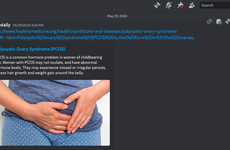
Penda Health Sees its First Patients in Kenya
Bianca — March 8, 2012 — Social Good
References: pendahealth
At the end of last year we profiled Penda Health, a for-profit women's medical clinic in Kenya that offers a compromise between free clinics where services are limited and expensive private clinics that are simply inaccessible to many patients. We also interviewed their co-founder, Stephanie Koczela, who explained more about the advantages of choosing a for-profit model over a nonprofit, namely that is more sustainable and scalable and results in higher quality patient care.
That was before the clinic had opened. We recently received an update from Stephanie that confirmed their business model is working, and how quickly things are happening.
Rapid Social Innovation
"We first had this idea in June 2011 and did our first focus group later that week. We decided to get serious about opening a clinic in late October 2011 and we saw our first clients on February 14th, 2012 only four months later. This was only one month after signing the lease on a room, which we then converted into a clinic in under a month.
"Social enterprise (to me) is all about solving urgent social problems - we see the need for improved women's healthcare as urgent and thus Penda Health has acted with urgency!"
The challenges
"It has been really difficult to find start up capital. Thus far our business has been financed by myself, my co-founder and a small pool of friends and family. We have a communicated with 50+ potential funders from impact investing firms, to angel investors, and foundations. They all say that they really like our model but that we are too early, or too late, or need too much money, or need too little money, or that we are in the wrong sector or the wrong part of the world. It's a very interesting and exciting challenge to realize that even those businesses that are promising and likely to succeed can have a very difficult time getting the capital needed to grow."
You can read more about Penda Health and read about the opening of the clinic and their very first patients in this blog post.
That was before the clinic had opened. We recently received an update from Stephanie that confirmed their business model is working, and how quickly things are happening.
Rapid Social Innovation
"We first had this idea in June 2011 and did our first focus group later that week. We decided to get serious about opening a clinic in late October 2011 and we saw our first clients on February 14th, 2012 only four months later. This was only one month after signing the lease on a room, which we then converted into a clinic in under a month.
"Social enterprise (to me) is all about solving urgent social problems - we see the need for improved women's healthcare as urgent and thus Penda Health has acted with urgency!"
The challenges
"It has been really difficult to find start up capital. Thus far our business has been financed by myself, my co-founder and a small pool of friends and family. We have a communicated with 50+ potential funders from impact investing firms, to angel investors, and foundations. They all say that they really like our model but that we are too early, or too late, or need too much money, or need too little money, or that we are in the wrong sector or the wrong part of the world. It's a very interesting and exciting challenge to realize that even those businesses that are promising and likely to succeed can have a very difficult time getting the capital needed to grow."
You can read more about Penda Health and read about the opening of the clinic and their very first patients in this blog post.
Trend Themes
1. For-profit Women's Clinics - The rise of for-profit women's clinics presents an opportunity for disruptive innovation in the healthcare industry, providing a compromise between limited free clinics and inaccessible private clinics.
2. Rapid Social Innovation - The fast-paced development and opening of women's clinics like Penda Health highlight the potential for disruptive innovation in the social enterprise sector, addressing urgent social problems with urgency.
3. Challenges in Funding - The difficulty in finding start-up capital for ventures like Penda Health uncovers a need for disruptive innovation in the finance industry, particularly impact investing firms and angel investors.
Industry Implications
1. Healthcare - For-profit women's clinics, such as Penda Health, are disrupting the healthcare industry by offering accessible and high-quality care to a wider patient base.
2. Social Enterprise - The success of Penda Health and their for-profit model showcases the potential for disruptive innovation in the social enterprise industry, solving urgent social problems with scalable and sustainable solutions.
3. Finance - The challenges faced by Penda Health in securing start-up capital highlight the need for disruptive innovation in the finance industry, particularly in increasing access to funding for promising ventures addressing urgent social issues.
2.1
Score
Popularity
Activity
Freshness























